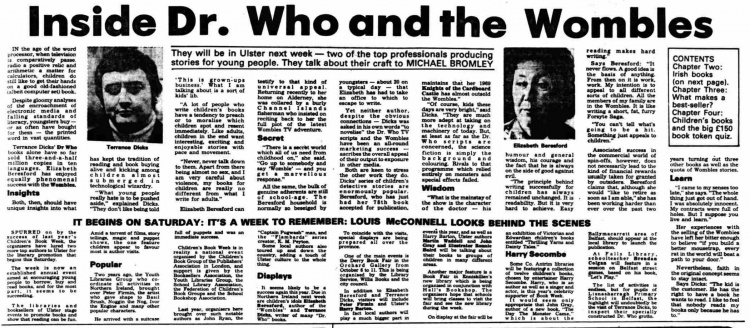Inside Dr. Who and the Wombles
- Publication: Belfast Telegraph
- Date: 1980-09-29
- Author: Michael Bromley
- Page: 9
- Language: English
IN the age of the word processor, when television s comparatively passe, radio a positive relic and arithmetic a matter for calculators, children do still like to get their hands on a good old-fashioned (albeit computer set) book.
Despite gloomy analyses of the encroachment of electronic media and falling standards of literacy, youngsters buy or as often have bought for them the printed word in vast quantities.
Terrance Dicks' Dr Who books alone have so far sold three-and-a-half million copies in ten languages. Elizabeth Beresford has enjoyed equally phenomenal success with the Wombles.
Insights
Both, then, should have unique insights into what has keep the tradition of reading and book buying alive and kicking among children almost submerged in technological wizardry.
"What young people really hate is to be pushed aside," explained Dicks. "They don't like being told 'This is grown-ups business.' What I am talking about is a sort of kids' lib.
"A lot of people who write children's books have a tendency to preach or to moralise which children spot and resent immediately. Like adults, children in the end want interesting, exciting and enjoyable stories with pace and movement.
"Never, never talk down to them. Apart from there being almost no sex, and I am very careful about violence, my books for children are really no different from what I write for adults."
Elizabeth Beresford can testify to that kind of universal appeal. Returning recently to her home on Alderney, she was collared by a burly Channel Islands fisherman who insisted on reciting back to her the full plot of the latest Wombles TV adventure.
Secret
"There is a secret world which all of us need from childhood on," she said. "Go up to somebody and say 'Womble' and you get a marvellous response."
All the same, the bulk of genuine adherents are still of school-age. The Beresford household is normally so beseiged by youngsters about 20 on a typical day that Elisabeth has had to take an office to which to escape to write.
Yet neither author, despite the obvious connections-Dicks was asked in his own words "to novelise" the Dr. Who TV scripts and the Wombles have been an all-round marketing success-ascribes the overall appeal of their output to exposure in other media.
Both are keen to stress the other work they do. Dicks' series of children's detective stories are enormously popular. Beresford, who has just had her 78th book accepted for publication, maintains that her 1969 Knights of the Cardboard Castle has almost outsold the Wombles."
"Of course, kids these days are very bright," said Dicks. "They are much more adept at taking on the technology and machinery of today. But, at least as far as the Dr. Who scripts are concerned, the science fiction is simply the background and colouring. Rivals to that which relied entirely on monsters and special effects failed.
Wisdom
"What is the mainstay of the show is the character of the doctor-his humour and general wisdom, his courage and the fact that he is always on the side of good against evil.
"The principle behind writing successfully for children has always remained unchanged. It is readability. But it is very hard to achieve.
Easy reading makes hard writing."
Says Beresford: "It never flows. A good idea is the basis of anything. From then on it is work, work. My intention is to appeal to all different sorts of children. All the members of my family are in the Womble.. It is like writing a short, fat, furry Forsyte Saga.
"You can't tell what's going to be a hit. Something just appeals to children."
Associated success in the commercial world of spin-offs, however, does not necessarily lead to the kind of financial rewards usually taken for granted by outsiders. Beresford claims that, although she would "like to retire as soon as I am able," she has been working harder than ever over the past two years turning out three other books as well as the quota of Wombles stories.
Learn
"I came to my senses too late," she says. "The whole thing just got out of hand. I was absolutely innocent. My contracts were full of holes. But I suppose you live and learn."
Her experiences with the selling of the Wombles have left her bitter enough to believe "if you build a better mousetrap, every rat in the world will beat a path to your door."
Nevertheless, faith in the original concept seems to stay intact.
Says Dicks: "The kid is the customer. He has the right to have a book he wants to read. I like to feel that nobody reads my books only because he has to.
Disclaimer: These citations are created on-the-fly using primitive parsing techniques. You should double-check all citations. Send feedback to whovian@cuttingsarchive.org
- APA 6th ed.: Bromley, Michael (1980-09-29). Inside Dr. Who and the Wombles. Belfast Telegraph p. 9.
- MLA 7th ed.: Bromley, Michael. "Inside Dr. Who and the Wombles." Belfast Telegraph [add city] 1980-09-29, 9. Print.
- Chicago 15th ed.: Bromley, Michael. "Inside Dr. Who and the Wombles." Belfast Telegraph, edition, sec., 1980-09-29
- Turabian: Bromley, Michael. "Inside Dr. Who and the Wombles." Belfast Telegraph, 1980-09-29, section, 9 edition.
- Wikipedia (this article): <ref>{{cite news| title=Inside Dr. Who and the Wombles | url=http://cuttingsarchive.org/index.php/Inside_Dr._Who_and_the_Wombles | work=Belfast Telegraph | pages=9 | date=1980-09-29 | via=Doctor Who Cuttings Archive | accessdate=24 April 2024 }}</ref>
- Wikipedia (this page): <ref>{{cite web | title=Inside Dr. Who and the Wombles | url=http://cuttingsarchive.org/index.php/Inside_Dr._Who_and_the_Wombles | work=Doctor Who Cuttings Archive | accessdate=24 April 2024}}</ref>
